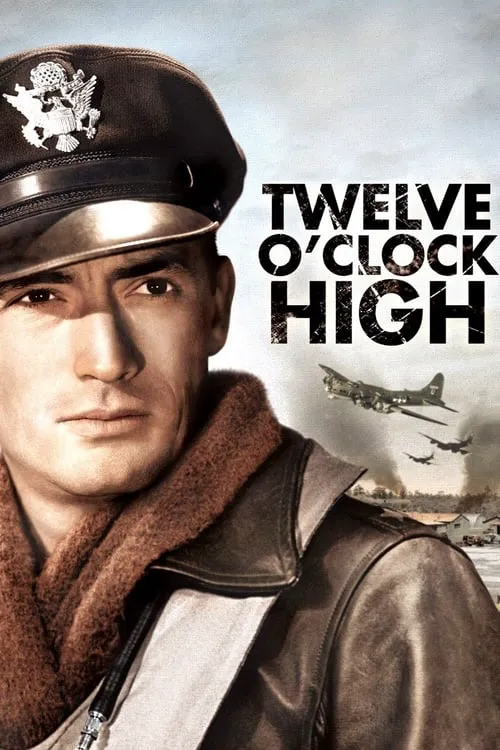Twelve O'Clock High

Plot
It's February 1943, and the strategic bombing campaign against Germany is still in its infancy. The Allies are determined to break the will of the Nazi regime through sustained and relentless attacks on their industrial capacity, but it's proving to be a daunting task. American daylight bombers are taking an increasingly heavy toll from German fighter planes and anti-aircraft defenses, and it becomes clear that something needs to change. Into this unforgiving context steps General Frank Savage, a seasoned and unyielding leader who has seen duty in various command positions since the outbreak of hostilities. The Air Force brass identifies Savage as the perfect man to take the reins of a hard-pressed bomber group, one that's accumulated a formidable reputation for its lack of discipline and heavy casualty rates on missions. Savage arrives at the British airfield, where the 918th Bombardment Group has been stationed for several weeks. As he steps out of the plane, he's immediately struck by the atmosphere of demoralized men who seem to have lost hope. Their morale is at an all-time low, and their performance on the battlefield has been accordingly poor. The men know they're losing too many friends and comrades, and the lack of clear leadership and discipline is taking a toll on their spirits. As Savage begins to assess the situation, it becomes clear that the group's commander, Captain Drexel Ganlock, has been holding the airmen back. Ganlock has been attempting to protect his charges from the harsh realities of combat, shielding them from responsibility and making excuses for their lack of performance. Savage sees through the façade immediately and recognizes that Ganlock is no longer the right man for the job. In a tense meeting with Ganlock and the group's flight commanders, Savage announces his intention to take command of the unit, citing his extensive experience and the need for bold, decisive action to restore order and confidence in the aircrew. Ganlock resents the move, seeing it as a challenge to his authority and a betrayal by the Air Force brass. As Savage assumes command, he sets out to instill confidence in his airmen and to create a winning attitude that will carry them through even the most harrowing battles. He starts with small steps, emphasizing the importance of teamwork and discipline, but swiftly graduates to more assertive measures when his men continue to disappoint on the battlefield. Savage pushes them hard, demanding nothing but their absolute best. His unyielding approach creates friction with many of the airmen, including the group's experienced but rebellious pilot, Captain 'All-American' Hoyt. Hoyt represents the spirit of the group, the men who feel they can coast through the missions without giving their all. Savage sees Hoyt as a symbol of the group's entrenched attitude and a direct challenge to his authority. He's determined to bring the young captain into line and to make him understand that the stakes are too high to indulge in such reckless behavior. Savage's tactics are met with resistance, and tensions begin to rise as the group's performance on missions continues to slip. Ganlock, feeling disrespected and powerless, starts to play politics, secretly sowing dissent among the senior officers and attempting to undermine Savage's authority. It becomes increasingly clear that Ganlock will stop at nothing to undermine Savage's efforts and restore the group to its former state. The crisis point comes when the 918th is scheduled to participate in a high-stakes raid on a heavily defended German target. The mission has been deemed critical, and Savage knows that his men are not yet ready. Despite the doubts and fears raised by his own crew, Savage makes a bold decision: he chooses to lead a follow-up formation on the German target, a move that's both reckless and calculated. By placing himself in harm's way, Savage aims to demonstrate his commitment to his men and to show them that the price of success is high, but achievable with determination and discipline. The raid on the German target is a harrowing experience for everyone involved. The skies are treacherous, the German defenses are formidable, and it seems as though the 918th is running into a buzzsaw. But Savage's men, having witnessed their leader's unwavering resolve and unshakeable faith in them, begin to rise to the challenge. They start to fly as they've never flown before, their formation tight and their aim true. As the mission unfolds, Savage's men demonstrate a newfound cohesion and a fierce determination to succeed, no matter what the cost. When the dust settles, the results are staggering. The 918th has delivered the heaviest losses the German defenses have suffered in weeks, and their reputation as a force to be reckoned with on the battlefield is cemented. For Savage, the victory is more personal: he's finally been able to turn the tide of morale within the group, imbuing his airmen with a renewed sense of purpose and pride. As the 918th returns to its base, battered but triumphant, it's clear that the transformation has begun. Savage's discipline and leadership have awakened a spirit within his men that refuses to be extinguished. He's created a winning attitude that can carry them through even the darkest moments of a brutal war. And as they celebrate their hard-won victory, the men of the 918th know that they owe it all to the unyielding spirit of their leader, General Frank Savage, who's shown them that with heart, courage, and teamwork, even the most daunting challenges can be overcome.
Reviews
Recommendations




